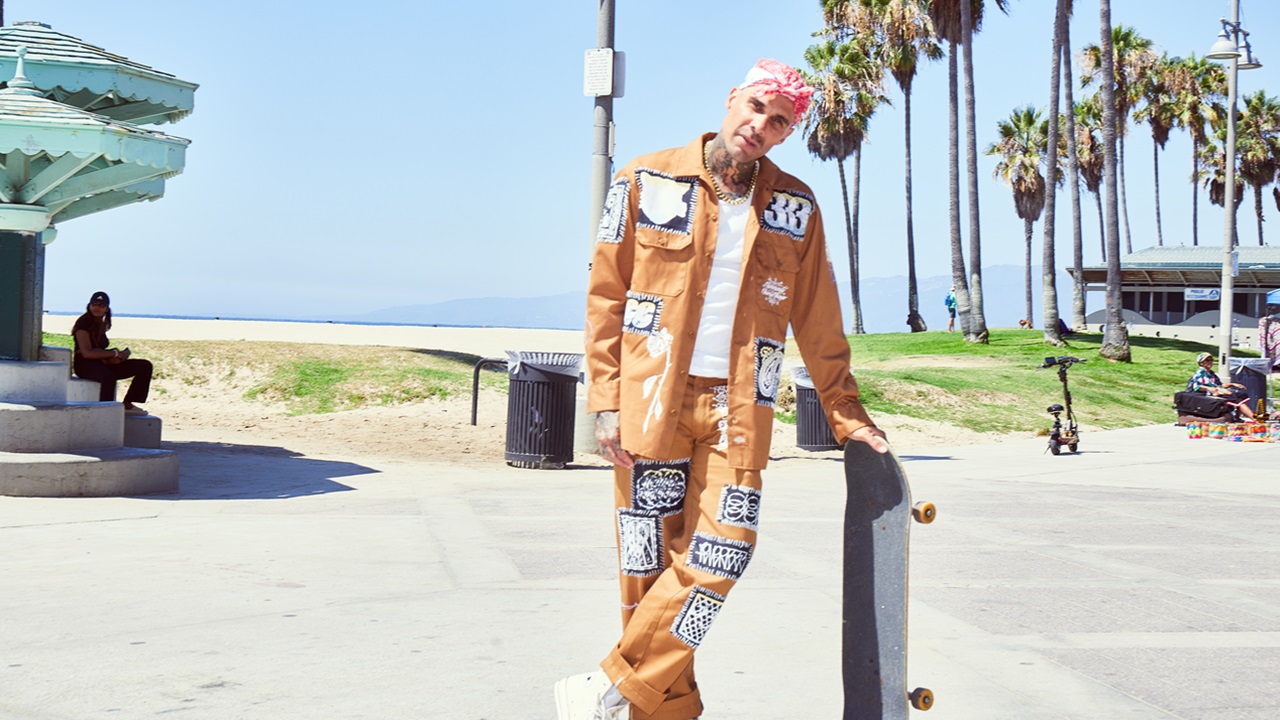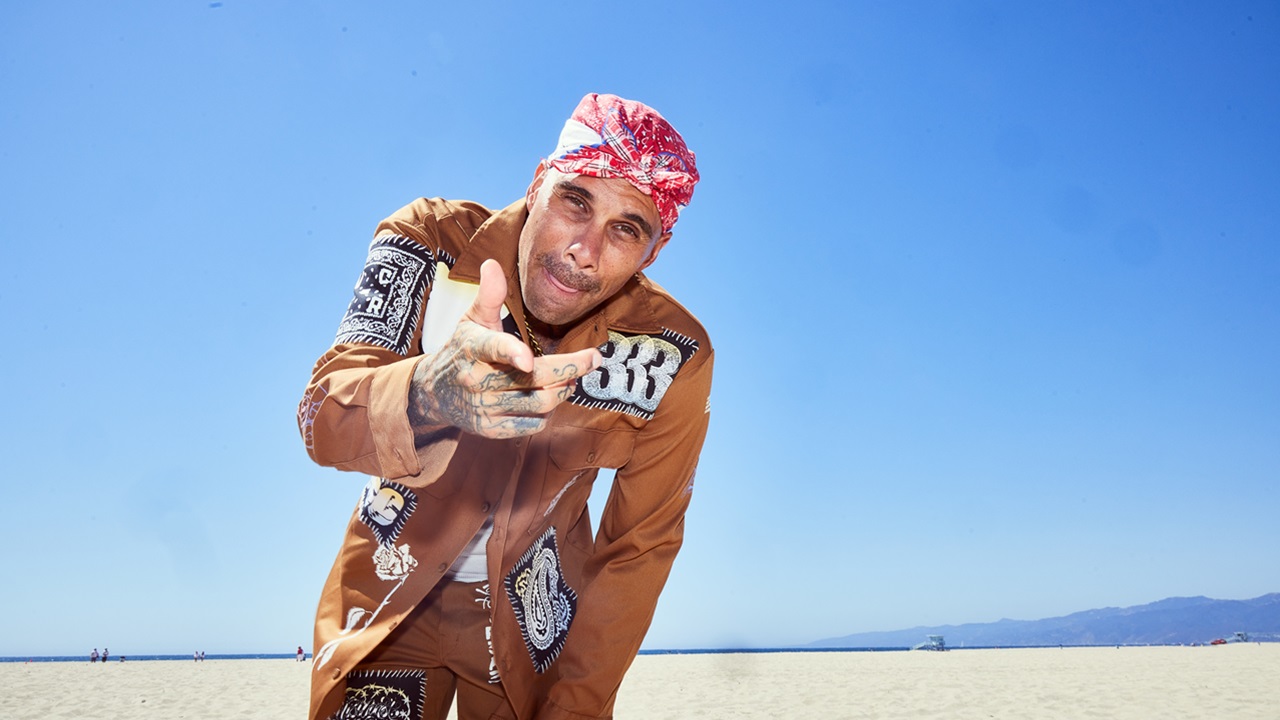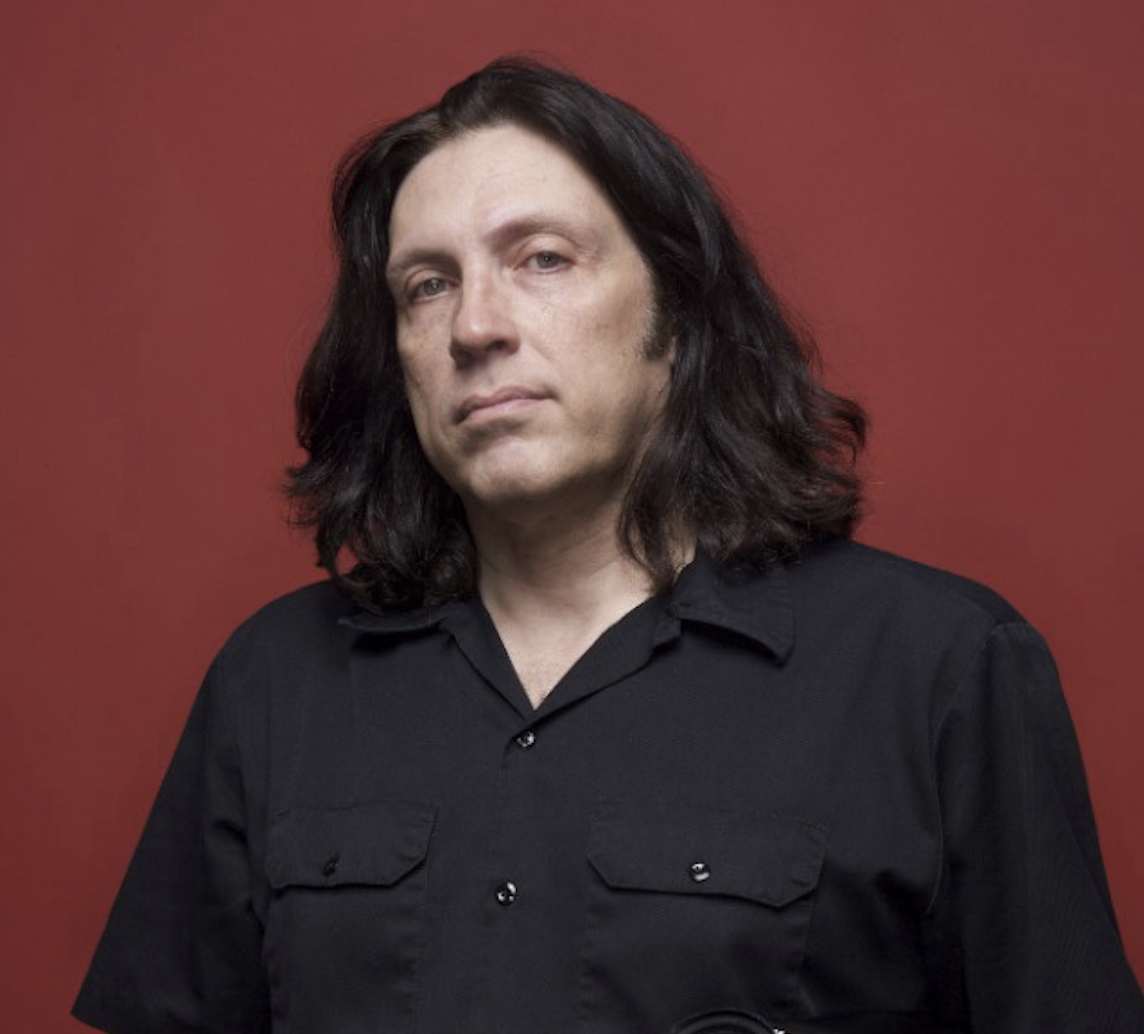It’s noon in Venice Beach when Jason Aalon Butler rolls up to the boardwalk on his skateboard, tattooed and anxious beneath the California sunshine. The leader of Fever 333 has much on his mind these days, with a new album and an entirely new line-up, a planned move to New Zealand with his wife and kids, and the ongoing weight of the world to inspire him.
He lives nearby now, and he looks pleased to be here, beneath the scattered palm trees, surrounded by a lively milieu of tourists and natives, the rich and down-and-out, skaters and merchants selling crystals and feathered Native American dreamcatchers. On the boardwalk an artist paints an abstract cityscape. Others lounge on the grass with their dogs. There is no such a thing as an outcast here.
“It really speaks to the whole idea of the convergence of cultures – everything from skateboarding to elements of gang culture, bohemian living, wealth,” says Jason, who has spent most of his life in the LA region. As a teen, he used to ride the bus with friends to visit Venice’s urban beach community to skate and hang out. “They all exist here and they coalesce here. It’s a really beautiful thing when you’re able to observe it, and also to be a part of it.”
We step into a café right on the boardwalk, and behind the counter is a young dude in an Iron Maiden T-shirt, tattooed forearms and stretched earlobes. He greets Jason with an excited reminder that their bands had shared stages years earlier, when the singer was in the post-hardcore act Letlive. Jason gives him a warm hug, then orders a matcha green tea and a thick slice of avocado toast.
The collision of culture Jason recognises in Venice can also be heard on Fever 333’s new album, Darker White. Its 14 songs are as intense as what came before from the band, but with an increased hip hop vibe, kicking off with New West Order, a biting autobiographical rap that claims Jason’s place as a person of mixed race in the music scenes he’s chosen: ‘In this rock shit ain’t nobody look like me / So I made my own lane / Pave my own damn way / Now, even OGs got respect to pay.’
The music video for New West Order was the first sign of Fever 333’s evolution, introducing the new line-up behind the singer: ace drummer Thomas Pridgen (The Mars Volta, Thundercat), with guitarist Brandon Davis and bassist April Kae. The video contrasted urban images with nature, with scenes of hustling on the streets and seaside serenity. Jason is frequently shown rapping while hog-tied on the asphalt.
“It’s just me trying to figure out my place in all this again, to rediscover it at least, or reposition myself in this game,” he explains. “I don’t want to exist in it the same way I did five years ago, four years ago, even last year, to be honest. I have a different perspective and lens that I view things through now. I need to figure out where I’m most comfortable and most effective in this industry and in art.”
Today, Jason is dressed in one version of the band’s current uniform: a tan two-piece outfit, covered in patches depicting barbed wire, graffiti, paisleys, and a white silhouette of the band’s panther head insignia. He also wears a red-and-white do-rag snugly over his scalp, knotted above his brow. For the singer, the band’s evolving uniforms are essential to Fever 333’s identity.
“Every great revolution has had an amazing brand attached to it,” Jason explains. “Black Panther Party, Communist Party, Democratic party, the Republican Party – they all have their insignia, their symbol, their branding. I just want people to know that every time we are anywhere, this is what we’re about.”
The new album project was interrupted by the pandemic and a long season of politics and mass protest in the United States, with a high-stakes presidential election (Trump vs. Biden), and public outrage over the on-camera killing of George Floyd, an African American, at the hands of Minneapolis police.
Stunned by what they’d seen, Black Lives Matter activists and mainstream Americans filled the streets, all at a time when feelings were already tense from the coronavirus and varying degrees of lockdown and sheltering in place in 2020. Jason took his eldest son, then barely a toddler, to a peaceful protest in Pan Pacific Park in Los Angeles, an event that later devolved into confrontation on the nearby streets amid burning police cars and broken windows.
It was like a flashback to 1992, when Jason was just seven and the 1992 Los Angeles riots erupted across the city and in his own neighbourhood after four LAPD cops were acquitted of beating motorist Rodney King, which had been captured on videotape for the world to see. Jason soon took his son home, but he returned to witness the conflagration.
“The true beginning of this album stemmed from that, when that perfect storm came to be,” he explains. “There were so many emotions and so many realisations that we were forced to have, some that I was ready for – or that I was already feeling – and a lot that I wasn’t feeling.”
During that long season of uncertainty, he spent his forced downtime writing songs, and also learned Logic and other music programs, preparing for whatever the future presented. For him, songs tend to start on acoustic guitar or with an electronic beat. Jason estimates that he created about 75 songs in preparation for the new album before choosing the final track list, leaving the rest for later.
“They weren’t ready to be cooked,” he says. “I prepped a lot of them, but I only put 14 in the oven.”
In performance, Jason is dependably intense, a raging, leaping, thrashing and testifying force of nature. But even in his toughest rhymes, there are moments of pain and vulnerability, such as on the new album’s urgent Desert Rap. It was partly inspired by the death of his grandmother, who was dedicated to serving her community.
The singer rages: ‘Grandmama died, said her heart couldn’t take no more so I / Should probably take that as a sign / I need to get out of my own way / It’s wearing me out / It’s more than I can take.’
His songs are meant to be revealing. “I just wanted to show that I was still a human,” he says. “As much as I get onstage and may seem bellicose and wild and maybe impervious to certain injury or whatever, I’m still a person. As strong as I want be, there’s plenty of weak moments as well through all this.”
For much of his band’s career, the most common comparison has been to the collision of metal and hip hop with radical politics epitomised by Rage Against the Machine. Now he is leaning hard into his rap impulses, without abandoning the rock engine behind him.
“Some people around me were like, ‘You sure you want to go that far right now?’” he recalls of initial reactions from his team. “I was like, it’s all I can do. It might be more rocking next time. I don’t know what it’s gonna be. I just went with whatever made the most sense in the room at the time.”
Jason takes some inspiration from earlier generations of players who took bold, unexpected leaps in their music – like the Beastie Boys stretching beyond the taunting, hilarious hip hop with which they made their name to something wilder and deeper over time. He also points to Machine Gun Kelly, whose fifth album veered from his previous hip hop style to guitar-based pop-punk.
“Who am I to put restraint on someone else or myself?” he points out. “Art is malleable and art is God.”
The new album follows the exit of guitarist Stephen Harrison and drummer Aric Improta from Fever 333 in 2022. They had grown frustrated with their lack of input into creating the band’s music. On Instagram, Stephen posted: “Aric and I have decided to leave Fever 333. I won’t get into the details but things were pretty bad internally. That plus creative differences sort of left me with no choice.”
As he sits by the boardwalk, watching as adolescents and hippie lifers glide past on bikes and skateboards, Jason expresses no anger with his former bandmates. He also freely admits that there was little or no room in the band for Stephen and Aric to have real input on the songwriting. From the beginning, he insists, the band project was always designed to be his personal expression, with the help of any players willing to join him.
“I just think that we wanted different things,” he says now of his former collaborators. “They’re incredible live performers. But sometimes what people want to give you isn’t what you need. And I didn’t need a lot of things, and I made it clear in the beginning. It can easily get confused what the situation is if you want to include your friends into something that is like a mission.”

The roots of Fever 333 were atypical. After Letlive went on hiatus in 2017, a chance encounter with Blink-182’s Travis Barker in a supermarket led to a discussion of the new band Jason wanted to lead.
Fever 333 was born in songwriting sessions with Travis and producer-songwriter John Feldmann, of the veteran punk act Goldfinger, resulting in an explosive debut EP, 2018’s Made An America. The blueprint was set, incorporating Jason’s diverse musical influences.
He grew up a mixed-race kid, the son of Black soul musician Aalon Butler, whose band, Aalon, released one album on Arista Records in 1977, and a white mother born in Scotland. He spent his early life in Inglewood, a working class LA suburb with a largely Black and Latino population. He was one of the few kids in his neighbourhood to ride a skateboard, practising tricks in his driveway.
By his teens, Jason was drawn equally to the aggressive sounds of punk rock and hip hop, obsessed as much with Black Flag as NWA. “A lot of us have this struggle with identity – not Black enough, not white enough,” he says, and his message is for young people dealing with those questions right now. “It’s hard sometimes to just be. That’s just my nod to those people. That sense of identity doesn’t have to just be racial either. It could be gender, it could be sexual orientation, it could be culturally, right? It could be so many things.”
In Inglewood, Jason and his neighbours lived in the shadow of the fabulous Forum, a storied arena for both basketball championships and decades of legendary heavy music concerts: Jimi Hendrix, Black Sabbath, Slayer, Nirvana and more. Jason fulfilled a childhood dream by performing at the Forum twice with Fever 333, in support of Blink-182 and Bring Me The Horizon.
In January, his surroundings will change again. He’s moving 7,000 miles away, to New Zealand. His wife, singer Gin Wigmore, is from the island, and the change of circumstances will mean a fairly radical change. It will mean settling down and making more space for family life, something that’s been increasingly hard to achieve in LA.
“I started to realise that I was sacrificing a lot of things that I truly didn’t even notice, that I didn’t even realise I was sacrificing in the name of this mission,” he says. “I used to believe Zack in Rage: yes, my anger is a fucking gift! But it’s consuming me. I see it and I feel it. My children see it, my wife sees it. It’s not good.”
He and Gin are selling everything ahead of the relocation. “Butler household fire sale,” he says with a smile. “If y’all want something, hit me up.”
Right now it’s the middle of the week, so the beach spread out in front of him isn’t packed with people, with lots of empty space on the sand. On the horizon, a single sailboat glides past in the distance. Later, he will try some kickflips on the boardwalk. Then he’ll roll back home, working toward that delicate balance between life and his chosen mission.
“I really want to believe that if I write the right song or if I pen the right lyric or craft the right type of art, it’ll speak bigger than any tour I’ve done yet, or any interview I’ve done, or any video I’ve put out, or any piece of content,” he says. “I want the art to really speak. And I think that pendulum might be shifting back that way.”
Two weeks after his visit to the boardwalk, things shift once again for Jason Aalon Butler. The autumn tour of the US, UK and Europe is cancelled, and in an online video message, the singer explains that the reason is “my most significant and challenging struggle with depression”.
Cancelling a major tour can be a serious shock to the system for any act, especially with a new album about to drop, but Jason had only been filled with sadness as the dates approached. Something had to change. “While I’m no stranger to these feelings, this time was different,” he says, speaking to his 169,000 Instagram followers. “And the mental period of anguish eventually devolved into physical ailments, and that affected not only me, but my family, my friends, and everyone around me, and that caused a pretty obvious turning point.”
Jason is an often intense artist who fuels his enraged songs by reflecting hard on the society around him. Right now, he’s turning that effort into healing himself, he says. How this will play out in 2025 is unknown.
In a follow-up message days after the release, Jason again speaks to fans, sounding hopeful for the future. “I’m already in my head, my heart and my spirit, thinking of the next thing,” he assures them. “I got more to come. To keep it super dooper real, I didn’t know how much more I had left. But I am falling back in love with it, me, art, struggle.”
“The suffering is part and parcel with progress.”
Darker White is out now via Century Media/333 Wreck Chords

![FEVER 333 - NEW WEST ORDER [OFFICIAL VIDEO] - YouTube](https://img.youtube.com/vi/4KDRlktxg6I/maxresdefault.jpg)
![FEVER 333 - DESERT RAP [OFFICIAL VIDEO] - YouTube](https://img.youtube.com/vi/bSfirBVp24Y/maxresdefault.jpg)
